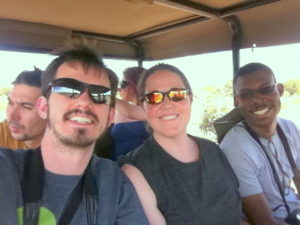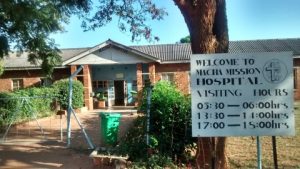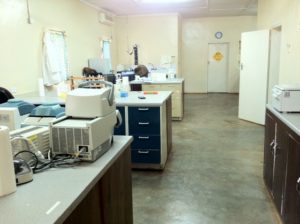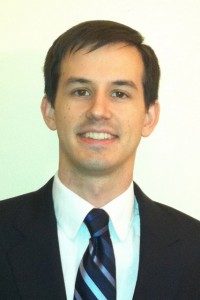Mennonite Health Journal
Articles on the intersection of faith and health
Reflections on SET in Zambia: Student Elective Term Report
John Stoeckle, MD
from Mennonite Health Journal, Vol. 15, No. 4 – November 2013
 It had been six years since I had been outside of the United States. Now I was bumping along in Zambia on the six-hour bus ride from the airport, observing the plains separated by small mountain ranges in this very rural country. Everything was very green, except for the rock and dust, which were red. Innumerable trees were twisting at unexpected angles like Van Gogh creations, popping on the backdrop of a hyper-real blue sky with big white clouds. The Zambians I met were easy-going and friendly, ready to help a sojourner trying to find his way for the first time.
It had been six years since I had been outside of the United States. Now I was bumping along in Zambia on the six-hour bus ride from the airport, observing the plains separated by small mountain ranges in this very rural country. Everything was very green, except for the rock and dust, which were red. Innumerable trees were twisting at unexpected angles like Van Gogh creations, popping on the backdrop of a hyper-real blue sky with big white clouds. The Zambians I met were easy-going and friendly, ready to help a sojourner trying to find his way for the first time.
As I seek to live out Christ’s call in my life, I have been guided to a career in family medicine and public health. I want to be a partner with underserved populations, sharing the love of God, and to be a part of a multi-pronged solution to inequity both locally and globally. I recently started as a family medicine resident at Thomas Jefferson University in Philadelphia. My medical school trip to Zambia gave me an invaluable look into the possibilities of global health research.
Since I was young, I have been drawn to the larger world. I would sit and spin a globe and dream about going to the places where my finger would land. My parents raised me to believe that I could do whatever I put my mind to, and those dreams slowly evolved into plans. Stories of the Democratic Republic of Congo, where my uncle and his family lived as missionaries, stayed with me. The idea of someday being a missionary seemed to me a viable career path.
In 2004, I traveled to Cambodia to teach children who were looking for a chance to escape poverty and again in 2006 to complete research on the history of healthcare in Cambodia through a foundation grant. As I came to appreciate the complex nature of affirming equality and dignity in cross-cultural partnerships, I looked for people who were innovative in modeling these qualities.
After my wife Sarah, a physician assistant, worked for one month at Macha Mission Hospital in Zambia in 2010, we both thought that Macha was a place where this careful balance was being pursued. As I heard about the successful ongoing malaria research, my heart jumped inside me.
 So I found myself in Zambia, enabled by a Mennonite Healthcare Fellowship SET grant, for a month-long rotation with the Macha Research Institute, eager to learn from a robust academic-international partnership, and to connect with a novel culture.
So I found myself in Zambia, enabled by a Mennonite Healthcare Fellowship SET grant, for a month-long rotation with the Macha Research Institute, eager to learn from a robust academic-international partnership, and to connect with a novel culture.
At the Malaria Research Institute, I worked on a project troubleshooting issues in reading old, stored malaria DNA samples which are used to identify malaria species and predict drug resistance. I worked in an impressive laboratory with about eight other Zambian lab scientists. Most were around my age, in their twenties and thirties. I found their mentorship, friendship, and company over my time there very meaningful.
 Dr. Thuma, who founded the malaria institute, has a self-admitted glass-half-full outlook. “You have to, to be able to work here,” he said. His optimism is a blessing as he looks to eliminate preventable sources of disease, and emphasizes the one child saved instead of the one child lost. Yet he is also realistic, not blind to the limits of what can be accomplished. He has shifted his focus from individual treatment to broader goals of fighting malaria, TB, and HIV, while realizing there are many clinical challenges that they have not yet been able to address with limited resources.
Dr. Thuma, who founded the malaria institute, has a self-admitted glass-half-full outlook. “You have to, to be able to work here,” he said. His optimism is a blessing as he looks to eliminate preventable sources of disease, and emphasizes the one child saved instead of the one child lost. Yet he is also realistic, not blind to the limits of what can be accomplished. He has shifted his focus from individual treatment to broader goals of fighting malaria, TB, and HIV, while realizing there are many clinical challenges that they have not yet been able to address with limited resources.
Malaria has in large part been successfully suppressed in the immediate region around the hospital through appropriate medical management and robust community empowerment and education. Studies are underway in Northern Zambia and Zimbabwe to see if this success can be replicated in other parts of the world. Dr. Sungano Mharakurwa, the research institute director, has direct oversight of these studies and others, and is hopeful of what they might find.
I was also able to spend some time seeing patients in the hospital. There were cases I had read in textbooks, and now here they were, in front of us: malaria, advanced stage malignancies, and other maladies which are preventable in America. I had forgotten, seven years removed from Cambodia, the human faces of suffering from these preventable illnesses.
It is human nature to live and think locally. In today’s global community, we tolerate enormous disparities among God’s family. The average Zambian lives 48 years. The average American lives 77 years. As a physician, this is compelling. The vast majority of preventable years lost in Zambia are from communicable diseases. We have the tools and resources as a world society to address HIV, TB, malaria, malnutrition, primary education, clean water, and internet for all. We must build partnerships to narrow these divides; we must not widen them.
In Zambia, I was reminded that I have to be intentional every day to allow a generous spirit to be cultivated within me, toward my neighbors in Philadelphia and my neighbors in Zambia. Will I use my material and economic resources in a way that will honor God’s love for all his children? Do I love all of God’s children?
I have lately been reflecting on Matthew 25. I realized that while I was in Macha, when I was hungry, I was invited in to eat nshima, the local corn-based staple. I was thirsty from the blazing sun on a community health visit, and I was given a seat, a cup, and something to drink in the shade. I was a stranger, and yet I was invited in again and again. My new Zambian acquaintances were walking in love and solidarity with me, and I was brought out of helplessness and into kinship. I hope I, and we, continue to do likewise, and complete the appeal: “I needed clothes and you clothed me, I was sick and you looked after me, I was in prison and you came to visit me…Truly I tell you, whatever you did for one of the least of these brothers and sisters of mine, you did for me.”

